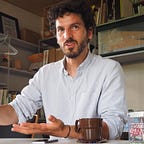[3/3] What I learned from visiting Fablabs & Makerspaces in Japan.
Last November and December, I had the opportunity to be able to work from Japan. So I went to visit and meet up with the Fab. scene in East Japan. As a matter of fact, even if most of the time I didn’t follow the protocol of making a proper appointment, I have to mention that I always have been happily welcomed. Often being invited for beer and dinner. Japanese Fab. people are really fabulous people.
Here is a list of the Fab. spaces I’ve visited and the team I’ve met : FabLab Shibuya, part of Co-Lab / &Fab, from Loft and MUJI stores, powered by FabLab Shibuya / Happy Printers / FabCafé Tokyo / Makers Base, avec Project Esin / Proto.Tokyo / Akiba DMM.Make / Fablab Kamakura / Fablab Kannai, Yokohama / FLAT, Fablab Sendai / Ferment, at Fujisawa SST / Lounge Fab Space — ラウンジFabスベース, operated by FabLab Shibuya.
And here is the FabMap Japan Youka Watanabe shared with me.
Typology of Fab. spaces.
One of the questions I asked when I was visiting the spaces was “Why did you open/start your fablab/makerspace?”. It was interesting to see the different reasons and motivations the drive all these people. Not that surprisingly, I believe this typology of spaces is pretty similar to what I know of in France. Would that apply to all maker spaces? Let me know you thoughts!
On one hand, some spaces were ‘Project development’ oriented versus ‘People development’ oriented.
The reason to open and operate the space was either to develop projects — find the relevant one in order to help them meet the market — or to develop people — empower people to learn new tool, new skills, to enlarge their network and nourrish their ideas.
The Project developement oriented spaces and team were looking to discover ‘protégé’ and ‘incubate’ their ideas. The People developement oriented spaces were more focussing on the community level, thinking about growing ‘residency’ and ‘fab. as a lifestyle’.
On the other hand, launching and running these spaces was either a ‘business opportunity’ versus a ‘purpose opportunity’.
When I was discussing with these Japanese Fab. people, some said that the Maker Movement represent business opportunities and starting such a space was an interesting market where to develop their business ideas. To some other space teams, such a project was first an opportunity to developp a collaborative working environment, sharing machines and knowledge, and making a living does not have to come from the space itself, but from collaborations.
Combining these 2 axis, here is the mapping of the Japanese Fab. spaces I visited so far. When I shared this vision with Japanese Fab. people, they say ot represent quite well the way spaces distribute themselves among eachother.
One remark : there is no project in the top right corner (Business opportunity / People development). Would that be an interesting spot for projects dedicated to a Fab. MOOC? Or Schools, or targeted trainings?
Singularity : the Tokyo Fabbers.
While I was in Japan, I joined the Tokyo Maker Faire. It was a nice place to meet other Fab. actors, but regarding the projects and the way the Faire was run, there was not many differences to what we experienced in Europe.
To the contrary, here is a very Tokyo specific event : Tokyo Fabbers. People from FabCafé do coordinate this event, but the idea is to gather the Tokyo Fab. scene to get them to show projects and discuss openly about how they are doing their business, what are the different positionings and ways to run a space.
That event is funded by the Tokyo Metropolitan — the equivalent for Paris to the Paris region governement. Fab. people get together and share their experience ; all of them learn from each other, and moreover, visitors can finally get a better understanding of what make these spaces different. Because again, it is not — only — about the machines, but about the teams. For the potential customer, this event happend to be enriching in ideas of projects and clarifying in places where to do that project.
What about starting a Paris Fabbers with la Région Île-de-France?
